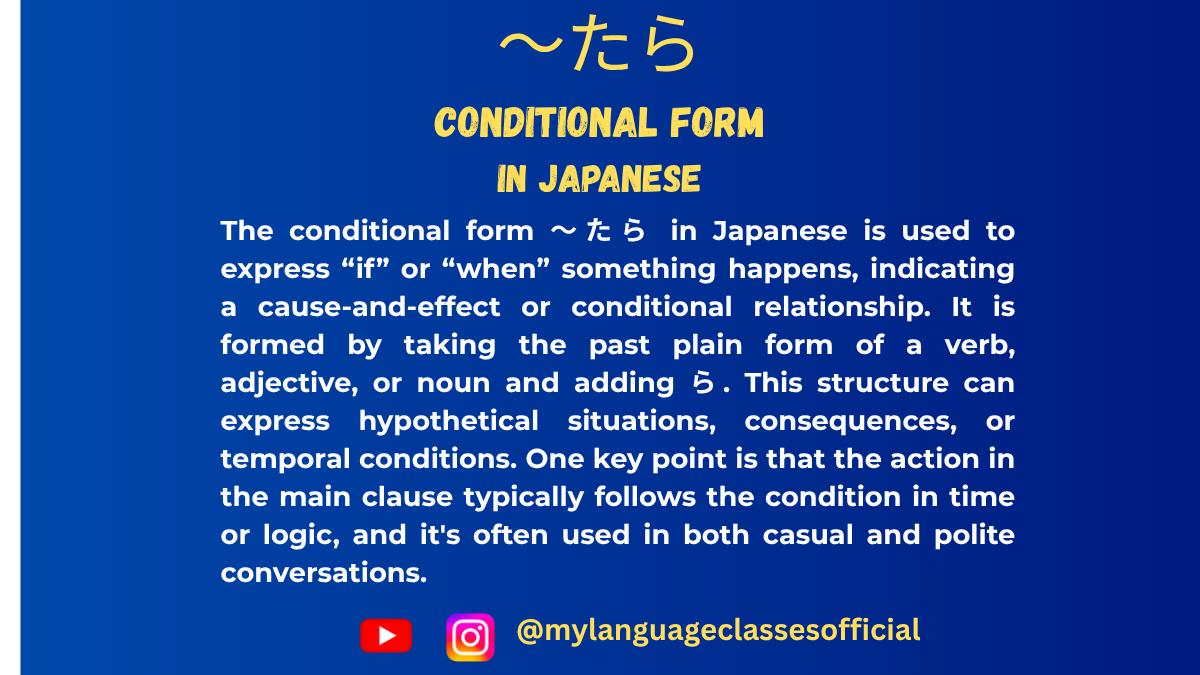Your cart is currently empty!
Tag: when to use たら
-

Understanding 〜たら (If/When) | My Language Classes
Understanding the Conditional “If” or “When” in Japanese
Japanese is a beautifully nuanced language, and understanding its conditional expressions is essential to mastering its grammar. Among these, 〜たら is one of the most versatile and commonly used forms to express conditionality. While it often translates to “if” or “when” in English, its usage varies depending on context. In this blog post, we’ll dive into everything you need to know about 〜たら, including its formation, usage, and specific examples for different scenarios.
What is 〜たら?
The term 〜たら comes from the た-form of verbs, adjectives, or copulas, combined with the particle ら. This construction is used to describe a condition that must be met for the second clause to occur. Its meaning can vary depending on the time and certainty implied in the context.
Formation:
- Verbs:
Base verb (た-form) + ら
Example: 食べる (to eat) → 食べたら (if/when [you] eat) - Adjectives (い-adjectives):
Drop the い, add かった, then add ら.
Example: 楽しい (fun) → 楽しかったら (if/when [it’s] fun) - Adjectives (な-adjectives) & Nouns:
Add だったら after the base word.
Example: 静か (quiet) → 静かだったら (if/when [it’s] quiet)
学生 (student) → 学生だったら (if/when [you’re] a student)
When to Use 〜たら
〜たら is used in a variety of scenarios, and understanding the context is key to choosing the right conditional expression in Japanese. Below are the primary uses of 〜たら with examples.
1. Hypothetical Conditions (“If”)
When describing a situation that may or may not happen, 〜たら acts like “if” in English.
- Example:
雨が降ったら、家にいます。
(If it rains, I’ll stay home.)
2. Temporal Conditions (“When”)
〜たら can indicate “when” for an action that will happen after the condition is met.
- Example:
宿題が終わったら、遊びに行きましょう。
(When you finish your homework, let’s go play.)
3. Unrealistic or Imaginary Conditions
When discussing hypothetical scenarios that are unlikely or purely imaginary, 〜たら is the go-to form.
- Example:
お金持ちだったら、世界中を旅行したい。
(If I were rich, I would like to travel the world.)
4. Unexpected Results
In some cases, the action in the second clause is surprising or contrary to what was expected from the condition in the first clause.
- Example:
ドアを開けたら、猫がいました。
(When I opened the door, there was a cat.)
[Note: The speaker didn’t expect a cat to be there.]
5. Past Actions Followed by Realization
〜たら is also used when an action is completed, and the speaker realizes or learns something new afterward.
- Example:
その映画を見たら、泣いてしまった。
(When I watched that movie, I ended up crying.)
6. Conditional Advice or Suggestions
To offer advice or make suggestions contingent on a condition.
- Example:
疲れたら、休んだほうがいいですよ。
(If you’re tired, you should take a rest.)
List of Situations Where 〜たら is Used
Here’s a concise list of common situations where 〜たら appears:
- Hypothetical conditions: Speculating about what might happen.
- Temporal conditions: Actions that occur sequentially.
- Unrealistic conditions: Hypothetical scenarios (e.g., dreams or fantasies).
- Surprising or unexpected outcomes: Actions that yield unforeseen results.
- Post-event realization: Discoveries made after completing an action.
- Giving advice or suggestions: Contingent recommendations.
- Plans based on conditions: Situations where future actions depend on prior conditions.
How is 〜たら Different from Other Conditionals?
Japanese has several conditional forms, such as と, ば, and なら, which can sometimes overlap in meaning. Here’s how 〜たら compares:
- 〜たら is versatile and works for past, present, and future conditions, as well as hypothetical and temporal situations.
- と emphasizes natural consequences or inevitable results (e.g., “If you press this button, the door will open”).
- ば is more formal and focuses on hypothetical or logical outcomes.
- なら introduces a topic or focuses on conditions assumed to be true (e.g., “If it’s about Tokyo, I know a lot”).
Practice Makes Perfect!
To truly master 〜たら, practice creating sentences for various scenarios. Start with simple sentences like:
- 雨が降ったら、どうしますか?
(If it rains, what will you do?)
Then, challenge yourself with complex structures:
- この本を読んだら、新しい考え方が学べると思います。
(I think if you read this book, you’ll learn a new way of thinking.)
Conclusion
Understanding 〜たら is essential for fluency in Japanese. Its flexibility allows it to cover a range of situations, from hypothetical scenarios to real-life sequential actions. By practicing its usage and comparing it to other conditionals, you’ll be able to express yourself naturally and accurately in Japanese. Remember, context is everything, so keep practicing, and soon enough, using 〜たら will feel as natural as saying “if” or “when” in English!
If you enjoyed this lesson, be sure to check out more posts like this on my blog at My Language Classes. Don’t forget to subscribe my YouTube channel and follow me on Instagram for the latest language learning tips and lessons. Leave a comment below to share your thoughts, or ask any questions you have about nouns.
Happy learning! 😊
- Verbs:
